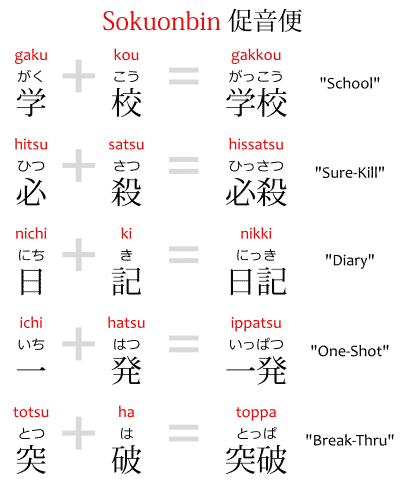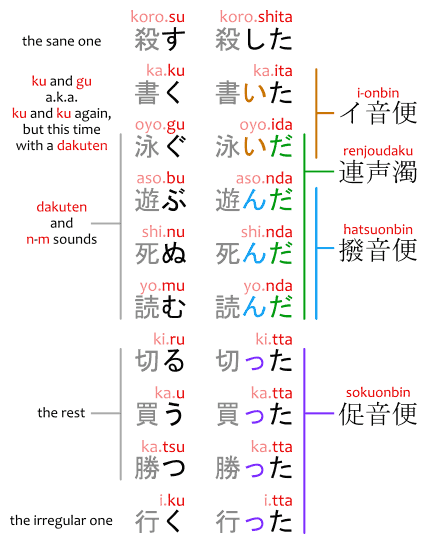It's why gakusei 学生, "student," and koukou 高校, "high school," combine not into gaku-kou がくこう, as you would expect, but into gakkou がっこう (学校), "school," changing the ku く of the first morpheme into the small tsu っ.
Other examples include: ippatsu 一発 (ichi + hatsu), ikkagetsu 一ヶ月 (ichi + kagetsu), kekkou 結構 (ketsu + kou), mikka 三日 (mitsu + ka), nikki 日記 (nichi + ki), and so on.
Source: japanesewithanime.com (CC BY-SA 4.0)
Explanation
The sokuonbin is one of the various different types of onbin 音便, which are euphonic changes.Basically, a lot of Japanese words are made from joining multiple morphemes together. The morphemes have a meaning and a pronunciation. They're often spelled with one kanji, so they become, in practice, the meaning of the kanji and the reading of the kanji.
Thus, a word formed by two morphemes, like "high," kou 高, and "school," kou 校, ends up being spelled with two kanji, like koukou 高校, "high school."
Many words are formed by grabbing one morpheme that means one thing, and another morpheme that means another thing, and joining them to make a word that means the sum of those two things.
For example, if you combine ichi 一, "one," and nichi 日, "day," you get ichinichi 一日, "one day."
The problem is that sometimes you combine two morphemes because of their meanings, and the result isn't phonologically pleasant. It's a pain to pronounce.
For example, you want to say "one color," so ichi 一, "one," and shoku 色, "color." Together:
- ichi-shoku
いちしょく
一色
One color.
If you say this fast enough, the ~chi and sho~ sounds end up merging together. That's how you get:
- isshoku
いっしょく
一色
One color.
When the second morpheme starts in ha-hi-fu-he-ho はひふへほ, it will turn into pa-pi-pu-pe-po ぱぴぷぺぽ. This is a process called handakuonka 半濁音化, which is similar to rendaku 連濁.
For example, if you join "one," and "small animal," hiki 匹, you get:
- ichi-hiki
いちひき
(becomes...) - ippiki
いっぴき
一匹
One small animal.
That's handakuonka. On the other hand, if the first morpheme was "three," san 三, you would get rendaku, which would change hi ひ to bi び, and sokuonbin wouldn't occur:
- san-hiki
さんひき
(becomes...) - sanbiki
さんびき
三匹
Three small animals.
Occurrence
The sokuonbin happens mostly when the first morpheme ends in ~chi ち, ~tsu つ, or ~ku ~く, and the second morpheme starts with h~, k~, or t~. In other words, when you have two hard, dry syllables one after the other.Verbs
In the conjugation of godan verbs of certain endings, some forms composed of the ren'youkei 連用形, which ends in ~i, plus a jodoushi 助動詞, can suffer sokuonbin.This happens with the godan verbs endings ~u ~う, ~tsu ~つ, and ~ru ~る. With the jodoushi ~ta ~た, ~te ~て, ~tara ~たら, and ~tari ~たり.
For example, the past form of "to kill," korosu 殺す, is koroshita 殺した, "killed," because the verb ends in ~su, and the sa-row is sa-shi-su-se-so さしすせそ.
Consequently, the past form of katsu 勝つ, "to win," should be kachita 勝ちた, since the verb ends in ~tsu, and the ta-row is ta-chi-tsu-te-to たちつてと. However, in practice, it ends up being katta 勝った, "won," with the ~chi-ta boundary merging through sokuonbin.
Similarly: iu 言う, "to say," becomes itta 言った, "said," not ii-ta いいた. And naru なる, "to become," becomes natta なった, "became," not nari-ta なりた.
The verb iku 行く, "to go," also suffers sokuonbin, despite ending with ~ku. For example: itta 行った, "went."
Reminder: it applies to multiple jodoushi: katta 勝った, katte 勝って, kattara 勝ったら, kattari 勝ったり. It doesn't apply to everything that uses the ren'youkei. The polite form is kachimasu 勝ちます, for example.
See onbinkei 音便形 for further details.
Source: japanesewithanime.com (CC BY-SA 4.0)
Non-Verbs
Although sokuonbin is its narrow sense refers to the change in verbs, in a wider sense it's also used to refer to the change in nouns, adverbs, and pretty much any word.Unprescribed
In dictionaries that list the readings of kanji, readings altered by sokuonbin aren't listed.That means a dictionary will contain the reading ichi いち for 一, but it won't contain i' いっ, even though 一 becomes i' いっ in a lot of words.
On the other hand, dictionaries do show the reading of words with sokuonbin applied. This means if you look up ippiki 一匹, it will say it's read as ippiki いっぴき, the way it's actually pronounced, not as ichi-hiki いちひき, by simply gluing the two readings together.
In some cases, a word that's supposed to be pronounced without sokuonbin according to the dictionary gets pronounced with the sokuonbin in practice.
For example, sentaku 洗濯 means "washing clothes," and ~ki ~機 means "machine." Therefore, sentaku-ki 洗濯機 is a "cloth-washing machine."
Sometimes, people pronounce this as sentakki せんたっき, instead of sentakuki せんたくき. This is an acceptable way of pronouncing it, but it's not a formal way of spelling how it's supposed to be read. [洗濯機は「せんたっき」ですか?「せんたくき」ですか? - detail.chiebukuro.yahoo.co.jp, accessed 2019-11-27]
Historic
Sometimes, sokuonbin happens for historic reasons.For example, shippo 尻尾, "tail," is read as shippo in modern Japanese, but its parts are shiri 尻 and o 尾 respectively. In the past, the word was read shirio 尻尾, but this o 尾 was treated as if it was a ho ほ and turned into a po ぽ.
There are also many cases of words that were spelled or pronounced differently at the time they started being pronounced with sokuonbin.
For example, in the past, 早 could be as read safu さふ. Nowadays, words that would have that reading are read as sa' さっ instead. For example:
- safu-soku
さふそく
(becomes...) - sassoku
さっそく (早速)
Promptly.
The word "husband," otto おっと (夫), originates from wohito をひと. As far as I know, this wo を should sound like o お, and the hi ひ of the past is now pronounced as i い, so the modern pronunciation could be something like oito おいと, which is pretty close to otto おっと.
Sokuon Insertion
The term sokuonbin can also refer to cases where a sokuon is inserted between two morphemes, as opposed to changing the last syllable of the first morpheme into a sokuon. [促音便 - 大辞林 第三版 via kotobank.jp, accessed 2019-11-27.]This generally happens when dealing with prefixes and suffixes.
For example, in the word masshiro 真っ白, "pure white," which is composed of the morpheme ma 真, "true," and shiro 白, "white." The same thing happens with massao 真っ青, makka 真っ赤, and makkuro 真っ黒, for pure blue, red, and black respectively.
Sometimes its prefixed to futatsu 二つ, "two."
- mapputatsu
まっぷたつ (真っ二つ)
"True two." Often used when someone uses an axe, knife, or whatever, and splits something evenly into two parts.
The word ko 子, literally "child," is often used to refer to a girl. Sometimes it's spelled like musume 娘, "daughter," "girl," in order to make that explicit. When as a suffix, it turns into ~kko ~っ子, or ~kko ~っ娘. For example:
- meganekko
眼鏡っ娘
A girl who wears "glasses," megane. - bokukko
ボクっ娘
A girl who uses the first person pronoun boku 僕, which is generally used by boys instead.
The suffix ppoi っぽい gains a sokuon pretty much any time it's used: nekoppoi 猫っぽい, "cat-like." That's because, without the sokuon, it would sound like a single four-mora word: nekopoi ねこぽい.
Intensification
The sokuon can also be added in the middle of random words for added intensity. For example, the word sugoi すごい (凄い), "incredible," can be pronounced as suggoi すっごい for intensity: "AMAZING!"This is the same thing that happens with yahari やはり and yappari やっぱり, both meaning "as I thought," or something like that, with one just being stronger than the other.
Examples
For reference, some examples of sokuonbin.Note that chi and ti, and fu and hu, are different romaji of the same syllable. Despite starting with c and f, chi and fu are part of the ta-row and ha-row respectively.
- ta-chi-tsu-te-to, or
ta-ti-tu-te-to
たちつてと - ha-hi-fu-he-ho, or
ha-hi-hu-he-ho
はひふへほ
く + かきくけこ
- saku 作 + ka 家
sakka 作家
Author. - gaku 楽 + ki 器
gakki 楽器
Musical instrument. - toku 特 + kun 訓
tokkun 特訓
Special training. - toku 特 + ken 権
tokken 特権
Special right. Privilege. - kaku 格 + kou 好
kakkou 格好
Appearance. Look. Situation.
つ + かきくけこ
- ketsu 結 + ka 果
kekka 結果
Result. - hitsu 筆 + ki 記
hikki 筆記
Writing down. Taking notes. - hatsu 発 + kutsu 掘
hakkutsu 発掘
Excavation. - shitsu 湿 + ke 気
shikke 湿気
Moisture. - ketsu 結 + kon 婚
kekkon 結婚
Marriage.
ち + かきくけこ
- ichi 一 + ka 家
ikka 一家
One house. One family. - nichi 日 + ki 記
nikki 日記
Diary. - ichi 一 + ku 句
ikku 一句
One verse. One poem. - ichi 一 + ken 件
ikken 一件
One case. One matter. - ichi 一 + ko 個
ikko 一個
One object. One thing. One article.
つ + たちつてと
- metsu 滅 + ta 多
metta ni nai 滅多にない
Rare. (rarely happens) - setsu 設 + chi 置
secchi 設置
Establishment. Installation. - setsu 摂 + tsu 津
settsu 摂津
(a province of Japan, because there weren't any other words for the tsu + tsu spot) - katsu 勝 + te 手
katteni 勝手に
Arbitrarily. On its own. - shitsu 嫉 + to 妬
shitto 嫉妬
Jealously.
ち + たちつてと
- ichi 一 + tai 体
ittai 一体
One body.
Also: "WHAT?!" - ichi 一 + chi 致
icchi 一致
Agreement.
Conformity. - ichi 一 + tsu 通
ittsu 一通
One copy of a document.
A pure straight in Mahjong, tiles 1 to 9! - ichi 一 + te 手
itte 一手
One move (in a game). - ichi 一 + tou 等
ittou 一等
First-class.
つ + はひふへほ
- shitsu 失 + hai 敗
shippai 失敗
Failure. - gatsu 月 + hi 日
seinengappi 生年月日
Birth date. - shitsu 疾 + fuu 風
shippuu 疾風
Gale. Strong wind. - gatsu 合 + hei 併
gappei 合併
Combination. - tetsu 鉄 + hou 砲
teppou 鉄砲
Gun.
ち + はひふへほ
- ichi 一 + han 般
ippan 一般
General. Ordinary. - ichi 一 + hiki 匹
ippiki 一匹
One small animal. - ichi 一 + fu 夫
ipputasai 一夫多妻
Polygamy. (literally "one husband, multiple wives.") - ichi 一 + hen 変
ippen 一変
Complete change. - ichi 一 + ho 歩
ippo 一歩
つ + さしすせそ
- hitsu 必 + satsu 殺
hissatsu waza 必殺技
SURE-KILL TECHNIQUE!!!!!!1111111 - zatsu 雑 + shi 誌
zasshi 雑誌
Magazine. - tatsu 達 + suru する
tassuru 達する
To reach. To arrive at. - tatsu 達 + sei 成
tassei 達成
Accomplishment. - hatsu 発 + sou 想
hassou 発想
Idea imagined.
ち + さしすせそ
- ichi 一 + sai 才
issai 一才
One year old - ichi 一 + shitsu 室
isshitsu 一室.
One room. - nichi 日 + suu 数
nissuu 日数
A number of days. - ichi 一 + seki 石
issekinichou 一石二鳥
Killing two birds with one stone.
(literally: "one stone, two birds.") - ichi 一 + sou 層
issou 一層
One layer. One storey.
Much more (like, a whole storey more).
Bonus: nichi 日 plus san 産 equals nissan 日産, the car company!


This is a sweet breakdown, thanks! It's totally not one of the more glorious subjects to cover, but I love how comprehensive you made it
ReplyDelete